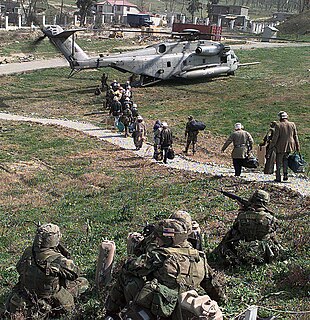
The Social Democratic Party of Albania is a social-democratic minor political party in Albania. The party held seats in Parliament between 1992 and 1996, and again from 1997 until 2009. It is currently led by Skënder Gjinushi, a former Minister of Education (1987–1991) and Speaker of Parliament.
The Unity for Human Rights Party is a social-liberal political party in Albania supporting the Greek minority. Founded in 1992, it represents Albania's minorities and is mainly related to the Greek minority, and is the political continuation of Omonoia. It works with Omonoia, MEGA and other Greek parties in Albania at national elections, under a Greek bloc. The party is currently led by Vangjel Dule, who held the party's only seat in Parliament until 2017.

Parliamentary elections were held in Macedonia on 18 October 1998, with a second round on 1 November. VMRO-DPMNE emerged as the largest party, winning 49 of the 120 seats, and later formed a coalition government with Democratic Alternative and the Democratic Party of Albanians.
Parliamentary elections were held in Montenegro on 20 October 2002. The result was a victory for the For a European Montenegro alliance formed by the Democratic Party of Socialists of Montenegro and the Social Democratic Party of Montenegro, which won 39 of the 75 seats. It was the last parliamentary election held in Montenegro prior to independence in 2006.

Parliamentary elections were held in Bulgaria on 19 April 1997. The result was a victory for the United Democratic Forces, which won 137 of the 240 seats. Voter turnout was 62.9%. Following the election, SDS leader Ivan Kostov became Prime Minister.

Parliamentary elections were held in Andorra on 16 February 1997. The result was a victory for the Liberal Union, which won 16 of the 28 seats. Its leader, Marc Forné Molné, remained Prime Minister. Voter turnout was 81.6%.
Parliamentary elections were held in the People's Republic of Albania on 28 May 1950. Candidates were nominated by the Democratic Front, which was an organization subservient to the ruling Albanian Party of Labour. The Front won all 121 seats, with voter turnout reported to be 99.4%.
Parliamentary elections were held in the People's Republic of Albania on 1 June 1958. The Democratic Front was the only party able to contest the elections, and subsequently won all 188 seats. Voter turnout was reported to be 100%.
Parliamentary elections were held in the People's Republic of Albania on 3 June 1962. The Democratic Front was the only party able to contest the elections, and subsequently won all 214 seats. Voter turnout was reported to be 100%.
Parliamentary elections were held in the People's Republic of Albania on 10 July 1966. The Democratic Front was the only party able to contest the elections, and subsequently won all 240 seats. Voter turnout was reported to be 100%.
Parliamentary elections were held in the People's Republic of Albania on 20 September 1970. The Democratic Front was the only party able to contest the elections, and subsequently won all 264 seats with 100% of the vote. Voter turnout was reported to be 100%.
Parliamentary elections were held in the People's Republic of Albania on 6 October 1974. The Democratic Front was the only party able to contest the elections, and subsequently won all 250 seats. Voter turnout was reported to be 100%.
Parliamentary elections were held in the People's Socialist Republic of Albania on 12 November 1978. The Democratic Front was the only party able to contest the elections, and subsequently won all 250 seats. Voter turnout was reported to be 100%, with all but one of the country's 1,436,289 registered voters casting votes.
Parliamentary elections were held in the People's Socialist Republic of Albania on 14 November 1982. The Democratic Front was the only party able to contest the elections, and subsequently won all 250 seats. Voter turnout was reported to be 100%.
Parliamentary elections were held in the People's Socialist Republic of Albania on 1 February 1987. The Democratic Front, a mass organization of the Party of Labour of Albania, was the only political force able to contest the elections, and subsequently won all 250 seats. Voter turnout was reported to be 100%.
Parliamentary elections were held in Albania on 22 March 1992, with a second round of voting for eleven seats on 29 March. The result was a victory for the opposition Democratic Party of Albania, which won 92 of the 140 seats. After the election Aleksandër Meksi became Prime Minister and Sali Berisha became President.
Parliamentary elections were held in Albania on 26 May 1996, with a second round of voting for 25 seats on 2 June. The result was a victory for the ruling Democratic Party of Albania, which won 122 of the 140 seats. Voter turnout was 89.1%.
Parliamentary elections were held in the People's Republic of Albania on 28 May 1954. The Democratic Front was the only party able to contest the elections, and subsequently won all 134 seats. Voter turnout was reported to be 99.9%.

Parliamentary elections were held in Bulgaria between 6 and 27 March 1938, the first after the 1934 coup. The elections were held on a non-partisan basis, with the Bulgarian Agrarian National Union and Bulgarian Communist Party banned. Pro-government candidates won a majority of seats. Voter turnout was 69.5%.
Parliamentary elections were held in Greece on 21 March 1868. Supporters of Alexandros Koumoundouros and Dimitrios Voulgaris won a majority of the 184 seats. Voulgaris remained Prime Minister, having assumed office on 6 February.






